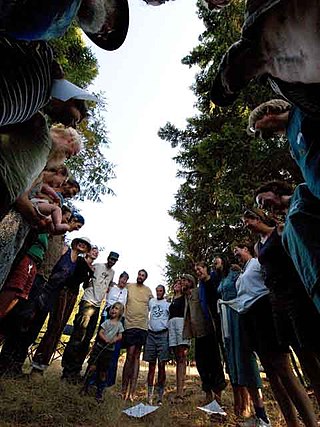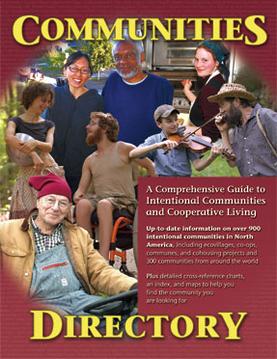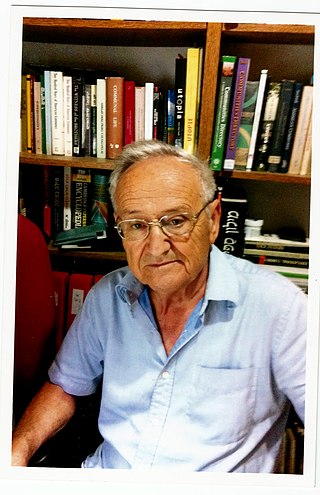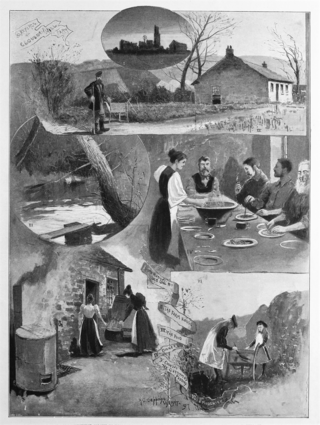
An ecovillage is a traditional or intentional community with the goal of becoming more socially, culturally, economically, and/or ecologically sustainable. An ecovillage strives to produce the least possible negative impact on the natural environment through intentional physical design and resident behavior choices. It is consciously designed through locally owned, participatory processes to regenerate and restore its social and natural environments. Most range from a population of 50 to 250 individuals, although some are smaller, and traditional ecovillages are often much larger. Larger ecovillages often exist as networks of smaller sub-communities. Some ecovillages have grown through like-minded individuals, families, or other small groups—who are not members, at least at the outset—settling on the ecovillage's periphery and participating de facto in the community. There are currently more than 10,000 ecovillages around the world.

Cohousing is an intentional community of private homes clustered around shared space. The term originated in Denmark in the late 1960s. Each attached or single-family home has traditional amenities, including a private kitchen. Shared spaces typically feature a common house, which may include a large kitchen and dining area, laundry, and recreational spaces. Shared outdoor space may include parking, walkways, open space, and gardens. Neighbors also share resources like tools and lawnmowers.

Twin Oaks Community is an ecovillage and intentional community of about one hundred people living on 450 acres (1.8 km2) in Louisa County, Virginia. It is a member of the Federation of Egalitarian Communities. Founded in 1967, it is one of the longest-enduring and largest secular intentional communities in North America. The community's core values are cooperation, egalitarianism, nonviolence, sustainability, and income sharing. About 100 adults and 17 children live in the community.

The Diggers were a group of religious and political dissidents in England, associated with agrarian socialism. Gerrard Winstanley and William Everard, amongst many others, were known as True Levellers in 1649, in reference to their split from the Levellers, and later became known as Diggers because of their attempts to farm on common land.

An intentional community is a voluntary residential community which is designed to have a high degree of social cohesion and teamwork. The members of an intentional community typically hold a common social, political, religious, or spiritual vision, and typically share responsibilities and property. This way of life is sometimes characterized as an "alternative lifestyle". Intentional communities can be seen as social experiments or communal experiments. The multitude of intentional communities includes collective households, cohousing communities, coliving, ecovillages, monasteries, survivalist retreats, kibbutzim, hutterites, ashrams, and housing cooperatives.
Egalitarian communities are groups of people who have chosen to live together, with egalitarianism as one of their core values. A broad definition of egalitarianism is "equal access to resources and to decision-making power." For example, decision-making is done by consensus or another system in which each person has a voice; it is not done hierarchically with only one or a few people making choices that will affect the whole group. If the group shares assets, they are distributed equitably throughout the group, and each member has access to more-or-less the same resources as any other member. Egalitarian communities are a type of commune.


The Foundation for Intentional Community (FIC), formerly the Fellowship of Intentional Communities then the Fellowship for Intentional Community, provides publications, referrals, support services, and "sharing opportunities" for a wide range of intentional communities including: cohousing groups, community land trusts, communal societies, class-harmony communities, housing cooperatives, cofamilies, and ecovillages, along with community networks, support organizations, and people seeking a home in community. The FIC is a nonprofit 501(c)(3) organization in the United States.
Communities: Life in Cooperative Culture is a quarterly magazine published by the Global Ecovillage Network - United States. It is a primary resource for information, issues, and ideas about intentional communities in North America. Articles and columns cover practical "how-to" issues of community living as well as personal stories about forming new communities, decision-making, conflict resolution, raising children in community, and sustainability.
The Metropolitan Church Association, also known as the Metropolitan Methodist Mission and Metropolitan Evangelistic Church, is a Methodist denomination in the holiness movement. The Metropolitan Church Association has congregations throughout the world, and in the 20th century, it possessed intentional communities in Wisconsin, Virginia, West Virginia, Louisiana, and Texas, among other locations.

Diana Leafe Christian is an author, former editor of Communities magazine, and nationwide speaker and workshop presenter on starting new ecovillages, on sustainability, on building communities, and on governance by sociocracy. She lives in an off-grid homestead at Earthaven Ecovillage in the Blue Ridge Mountains of North Carolina, U.S. She has said that living in an intentional community "is the longest, most expensive, personal growth workshop you will ever take."

The Communities Directory, A Comprehensive Guide to Intentional Community provides listing of intentional communities primarily from North America but also from around the world. The Communities Directory has both an online and a print edition, which is published based on data from the website.
Kommune Niederkaufungen is one of the largest intentional communities in Germany. Founded in 1986, it is an egalitarian, left-wing, income-sharing commune with consensus decision-making. It is situated in a complex of former farm buildings in the historic centre of the village of Niederkaufungen (Kaufungen), seven kilometres from the city of Kassel (Hessen). It has grown from 15 founder members to 62 adults and nearly 20 children and teenagers (2009). It is a member of "Kommuja", the German network of political communes and egalitarian communities.

Larling is a village and former civil parish, now in the parish of Roudham and Larling, in the Breckland district, in the county of Norfolk, England. The village is 8.5 miles east north east of Thetford, 21.4 miles west south west of Norwich and 94 miles north east of London. In 1931 the parish had a population of 159.

Yaacov Oved is a historian and Professor Emeritus in the Department of History at Tel Aviv University, member of Kibbutz Palmachim, research fellow at Yad Tabenkin: the institute of research and documentation of the kibbutz movement, researcher of the history of communes in the world and co- founder of the International Communal Studies Association.

The Friends of Perfection Commune is an American Utopian community in San Francisco, California. The commune was founded in 1967 on principles of a common treasury, group marriage, free anonymous art, gay liberation, and selfless service. They were originally called the Sutter/Scott Street commune, and commonly referred to as the Kaliflower commune, after their newsletter of the same name. Because the commune's publishing activities helped spread their philosophy, they became a significant influence on Bay Area culture. Many members of The Angels of Light, a free psychedelic drag theater group, originally lived in the Kaliflower commune. The name Kaliflower referenced the Hindu name for the last and most violent age of humankind, the Kali Yuga.

Clousden Hill Free Communist and Co-operative Colony was an anarcho-communist commune from 1895 until 1898 in Forest Hall, North Tyneside, Tyne and Wear, England. The commune was part of the back-to-the-land movement, operating a 12-acre farm under collective ownership and democratic control.

The One World Family Commune (OWFC), is a new age movement commune. It was formed in 1967 in San Francisco by 51 year old artist, café owner and UFO enthusiast Allen Noonan, who opened the first vegetarian restaurant in the city, completely operated by the commune's members. As a new age movement the OWFC practices the Everlasting Gospel, a combination of UFO beliefs, Christianity based themes of good and evil, expressed through uses of a life force, along with new age beliefs like spirituality and higher states of being.














